EU: we rescue only as a last resort!
Ralitsa Kovacheva, December 18, 2010
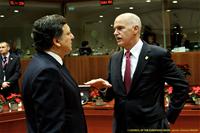 The permanent bailout mechanism for the euro area countries will be activated only when necessary. This becomes clear from the final text, which EU leaders agreed to be added to Article 136 of the Treaty on the functioning of the EU (TFEU) to set up a European Stability Mechanism: “The Member States whose currency is the euro may establish a stability mechanism to be activated if indispensable to safeguard the stability of the euro area as a whole. The granting of any required financial assistance under the mechanism will be made subject to strict conditionality.”
The permanent bailout mechanism for the euro area countries will be activated only when necessary. This becomes clear from the final text, which EU leaders agreed to be added to Article 136 of the Treaty on the functioning of the EU (TFEU) to set up a European Stability Mechanism: “The Member States whose currency is the euro may establish a stability mechanism to be activated if indispensable to safeguard the stability of the euro area as a whole. The granting of any required financial assistance under the mechanism will be made subject to strict conditionality.”
The change, compared to the draft conclusions, consists of adding the phrase "to be 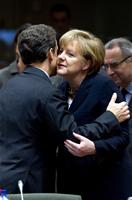 activated if indispensable”. This reflects the German position, according to which it had to be explicitly emphasized that the Mechanism is a choice of last resort, although obviously Ms Merkel has not won literally this phrase to be written in the Treaty amendment.
activated if indispensable”. This reflects the German position, according to which it had to be explicitly emphasized that the Mechanism is a choice of last resort, although obviously Ms Merkel has not won literally this phrase to be written in the Treaty amendment.
As it has already been revealed, the countries outside the monetary union may be included in the mechanism if they want to and whenever they decide, on an ad hoc basis. The exact design and functioning of the Mechanism are yet to be decided. It will succeed the current European Stabilisation Mechanism and European Financial Stability Facility (EFSF), created in May. The mechanism will be established by an intergovernmental arrangement and “will be activated by mutual agreement of the euro area Member States in case of risk to the stability of the euro area as a whole.”
This Treaty change (just adding two sentences in Article 136 of TFEU) is even smaller than all the options discussed so far and will be made under the simplified revision procedure provided for in Article 48 (6) TEU. The obvious goal is to ensure that there is no increase of the Union's competences, thus avoiding referenda envisaged by certain national laws. Because of the problems with the adoption of the Lisbon Treaty it was particularly important to avoid new referenda, especially at a time when Europe is swept by protests against the mass cuts in spending in most of the Member States.
By next spring, some key details of the Mechanism should be cleared, such as private sector participation. What we know so far is that “standardised and identical collective action clauses (CACs) will be included, in such a way as to preserve market liquidity, in the terms and conditions of all new euro area government bonds starting in June 2013.” The aim is this to be the legal basis for changing “the terms of payment (standstill, extension of the maturity, interest-rate cut and/or haircut) in the event that the debtor is unable to pay”.
 The big question, however, is whether the ESM is sufficient to ensure the long term stability of the euro area and the EU at large? The obvious answer is no. But the mechanism should not be regarded by itself, but in parallel with the attempts to strengthen the economic governance of the Union. The proposals submitted by the European Commission, aimed at strengthening fiscal stability and macroeconomic surveillance, must be approved by the Parliament and the Council by mid-next year. Only after they start working we can make a realistic assessment of the overall picture.
The big question, however, is whether the ESM is sufficient to ensure the long term stability of the euro area and the EU at large? The obvious answer is no. But the mechanism should not be regarded by itself, but in parallel with the attempts to strengthen the economic governance of the Union. The proposals submitted by the European Commission, aimed at strengthening fiscal stability and macroeconomic surveillance, must be approved by the Parliament and the Council by mid-next year. Only after they start working we can make a realistic assessment of the overall picture.
The link between the Mechanism and the new legislation for economic  governance was explicitly underlined by MEPs. During the first day of the European Council, they adopted a resolution in support of a permanent "bailout" mechanism, but stressing that it should not be decided "in back-room, late-night deals among Member States ". According to MEPs, the Parliament should participate in the discussion on the future Mechanism. The Council conclusions, however, clearly state that it will be consulted with Parliament, but will be established on the basis of an intergovernmental arrangement among the Member States and will be activated by an unanimous decision.
governance was explicitly underlined by MEPs. During the first day of the European Council, they adopted a resolution in support of a permanent "bailout" mechanism, but stressing that it should not be decided "in back-room, late-night deals among Member States ". According to MEPs, the Parliament should participate in the discussion on the future Mechanism. The Council conclusions, however, clearly state that it will be consulted with Parliament, but will be established on the basis of an intergovernmental arrangement among the Member States and will be activated by an unanimous decision.
MEPs also want “the Commission to present a comprehensive description of how investors, savers and market participants will be involved” and “to clearly indicate and prioritise which EU spending would need to be sacrificed if almost half the EU budget were to be requisitioned, as would be possible under the current (temporary) bailout mechanism rules.” (The Commission participates in the European Stabilisation Mechanism with 60 billion euro, guaranteed by EU's budget).
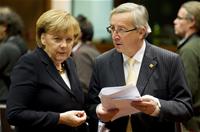 MEPs call “for the creation of a European stability agency to ensure a unified and highly liquid European bond market”. This is another major point of divergence with the Member States because the issue of Eurobonds has not been discussed at the European Council. Even judging by the relatively precise timetable by which the Council took place, apparently no controversial issues have been placed on the table.
MEPs call “for the creation of a European stability agency to ensure a unified and highly liquid European bond market”. This is another major point of divergence with the Member States because the issue of Eurobonds has not been discussed at the European Council. Even judging by the relatively precise timetable by which the Council took place, apparently no controversial issues have been placed on the table.
Perhaps the most critical among MEPs - the leader of the ALDE Group Guy Verhofstadt - responded with a statement only minutes after the end of the European Council. He said that the Mechanism would need Parliament's approval so that it “will use this opportunity to push the option of Eurobonds”. Creating a common Eurobond market together with the introduction of automatic sanctions for excessive deficits and closer economic and fiscal union are the three concrete reforms that the Union should take, Mr Verhofstadt said.
Greens/EFA co-president Rebecca Harms also criticised the leaders that “instead of grasping the nettle and agreeing to the far-reaching solidarity measures” and the “logical call for Eurobonds”, they have agreed to a more minimalist treaty change.
There are already clear signs that these ideas are yet to be discussed, although at 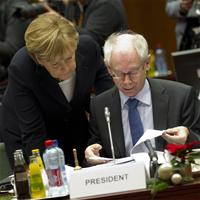 the moment they are provoking extreme reactions. Asked what he thought of Eurobonds the president of the EU Council, Herman van Rompuy, replied that a good idea should not be dismissed just because it was launched too early. Even France and Germany, who firmly refused to discuss the Eurobonds, have given indications that they had been considering a fiscal union and harmonisation of tax and labour law. But we are yet to see how far the Europeans are ready to go in this direction. Because it is still important to have a common direction and not simply to reallocate the burden on the stronger backs.
the moment they are provoking extreme reactions. Asked what he thought of Eurobonds the president of the EU Council, Herman van Rompuy, replied that a good idea should not be dismissed just because it was launched too early. Even France and Germany, who firmly refused to discuss the Eurobonds, have given indications that they had been considering a fiscal union and harmonisation of tax and labour law. But we are yet to see how far the Europeans are ready to go in this direction. Because it is still important to have a common direction and not simply to reallocate the burden on the stronger backs.
 And during the last European Council for this year (2010 is the year with the highest number of EU summits), some landmark events took place. For the first time in 12 years (since its creation), the European Central Bank has decided to increase its subscribed capital by 5 billion euro, from 5.76 billion euro to 10.76 billion euro, as of 29 December 2010. According to a Bank’s release, “the capital increase was deemed appropriate in view of increased volatility in foreign exchange rates, interest rates and gold prices as well as credit risk”. From a longer-term perspective, “the increase in capital is also motivated by the need to provide an adequate capital base in a financial system that has grown considerably.”
And during the last European Council for this year (2010 is the year with the highest number of EU summits), some landmark events took place. For the first time in 12 years (since its creation), the European Central Bank has decided to increase its subscribed capital by 5 billion euro, from 5.76 billion euro to 10.76 billion euro, as of 29 December 2010. According to a Bank’s release, “the capital increase was deemed appropriate in view of increased volatility in foreign exchange rates, interest rates and gold prices as well as credit risk”. From a longer-term perspective, “the increase in capital is also motivated by the need to provide an adequate capital base in a financial system that has grown considerably.”
From the height of the debt crisis in the euro area, the ECB has bought huge amounts of euro area debt, primarily from the so-called peripheral economies - Greece, Ireland, Portugal. So far, according to the Financial Times, the ECB has bought almost 70 billion euro of eurozone government bonds.
Meanwhile, the Moody's rating agency downgraded Ireland’s credit rating to Baa1. Portugal is also threatened by a downgrade by both Moody's and Standard & Poor's because of fears that the country would request help from the euro area rescue fund. According to an analysis of the Italian UniCredit bank, next year the eurozone will have to refinance or repay 560 billion euro - this is 45 billion euro more than 2010 and is a record since the creation of the euro so far. Only Portugal accounts for 20 billion of the total, which is making it almost a certain client of the rescue fund. For the entire 2011 the euro area will borrow 925 billion euro, UniCredit estimates.
While departing, everyone in Brussels seemed relieved that the European Council has 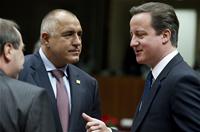 ended and wished themselves a Merry Christmas. However, whether Santa will fulfill the leaders' wishes of fiscal stability and economic growth? And whether we are ready our desires to be fulfilled at the cost of stringent restrictions and harder work? Each of us must answer this question while reaching for the gift under the tree.
ended and wished themselves a Merry Christmas. However, whether Santa will fulfill the leaders' wishes of fiscal stability and economic growth? And whether we are ready our desires to be fulfilled at the cost of stringent restrictions and harder work? Each of us must answer this question while reaching for the gift under the tree.
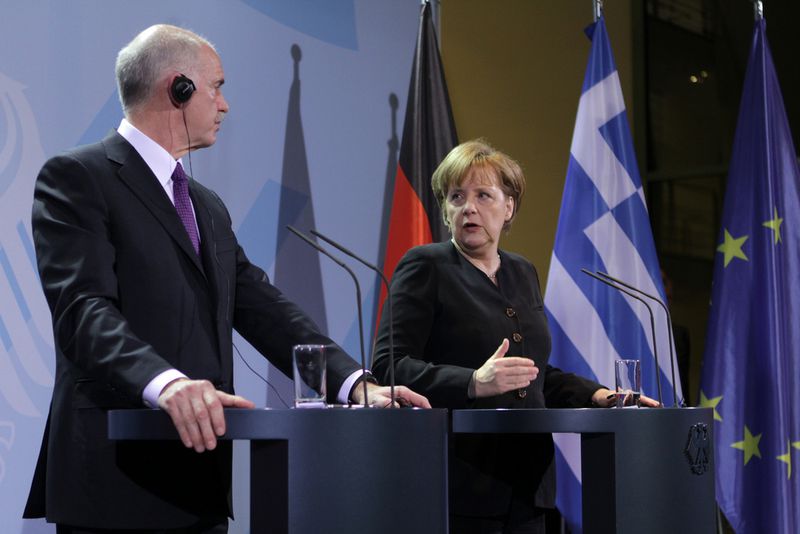 | © www.primeminister.gov.gr
| © www.primeminister.gov.gr | © European Commission- Audiovisual Service
| © European Commission- Audiovisual Service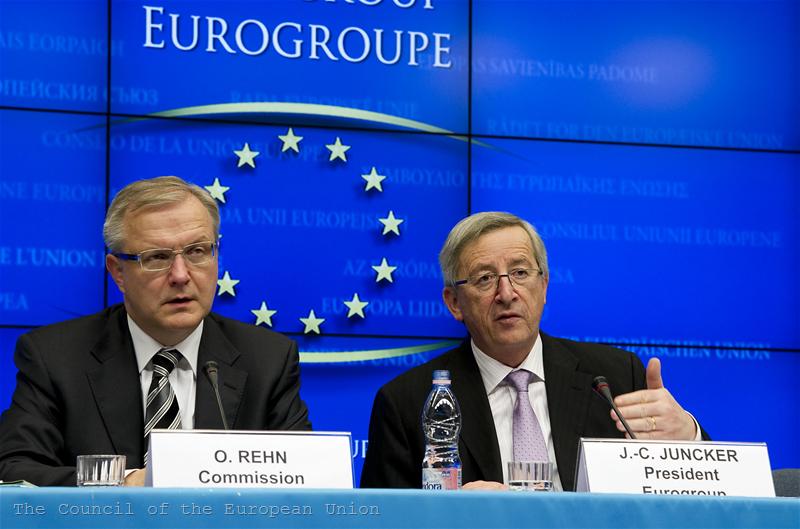 | © The Council of the European Union
| © The Council of the European Union